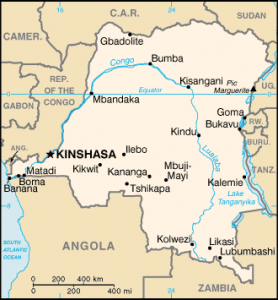
'Multinational mining activities are introducing another era of colonialism in Tanzania as they hold major decisive positions on the use of prime land areas, and profit greatly from the mining of valuable mineral resources. In the recent past, Tanzanians have raised concerns on how the multinational mining companies plunder the natural resources at the expense of the local people. Because of the prevalent high rates of this pillaging of the national stock of natural resources, the citizenry have woken with an uproar to question the government's stance on ensuring land security for its people, and benefits from their resources.'
As in Nigeria's oil-producing Delta region, so local communities in Tanzania are unable to benefit from the natural resources found on their lands and in their seas - either in terms of development or compensation. In 2007 President Kikwete set up the Bomani Commission to investigate the 'the accusations of "theft" of natural resources and gross human rights violations'. The report found that the Tanzanian Government had been 'manipulated' by the transnationals in such a way as to leave citizens 'in the merciless hands of the mining companies’. The Government was found to be complicit in the exploitation of its own people.
Two of the major mining companies operating in Tanzania are Canadian: Barrick and Tanzania Royalty Exploration Corporation. Together they control over 50 per cent of Tanzania's gold projects. A recent special issue by Pambazuka News and Africa Files exposes some of the 'murkier' aspects of Canadian mining corporations. Though relatively new to mining in Africa, Canada has now become the 'superpower' of mining on the continent, with interests in an astounding 35 countries worth some $14.7 billion in 2007.
The huge Canadian presence in African mining concerns is not in itself a problem. The problem lies in the way the mining companies operate. According to Alain Denault, author of Noir Canada: Pillage, corruption et criminalité en Afrique, Canadian mining firms operating in Africa are involved in levels of abuse worse than those perpetrated by the former colonial empires. In the early 1990s, just after the World Bank-inspired privatization wave, Canadian firms were profiting from the Mobutu regime in the DRC. Shortly after, Laurent Kabila's rebellion erupted. Within a few weeks, the conflict was full-blown. The mining firms - including the Canadians - moved over to the winning side. Mining contracts signed by Kabila were soon distributed, enabling Kabila to receive the financial means to support his war effort and de facto international economic legitimacy, even before the fall of the Mobutu regime. For Canadian companies like Banro Corporation or Barrick Gold, the regime didn't matter, so long as business remained lucrative.
As long as these kind of colonialist practices and human rights violations are allowed to continue - through the collusion of the multinationals themselves, and Western governments and corrupt African leaders turning a blind eye - it is going to be near impossible for countries such as the DRC and Angola to find the peace the people so much desire.
